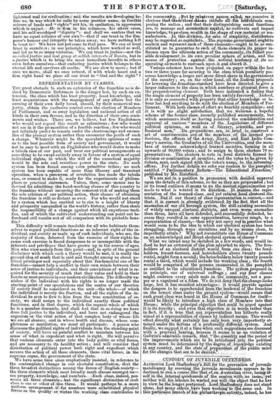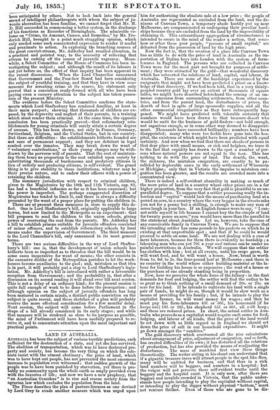1:Trill 0 ,ri1RPT 0 DY OF
S.
UppNalai ShafteshmAiigi !sr ,e, mention of juvenile Wen4le4111)Ir ; Y rose • .41 '-'11Yen,d0 ;Men 1. appears te; he
deStReclitP fluA.O. POP:Ser ,c,..,4.11,1 river, losingit-
Rif 41,4P,Niff igulf4E114pcIt3,9 49..f#9 lOniweit ;no issue4et poit1iwiviiiAls4a ORT4./3911Wt#11419iyjtlg Algot that he has 11117flewahAg:tlaig qtP9atPfinafli ' ;does not stand filnn4' 14 MaP ex,14.14Ye bPen wpr*ing fp 1 kfieme end. In this Rek,..imilim benne, ef hitt,p1ilantlarop,tax4yaty5indeed, he has been anticipated by others. Not to look back into the general crowd of intelligent philanthropists with whom the subject of ju- venile aberration has been familiar, we cannot forget that Mr. M. D. Hill succeeded in commencing a better system, in the discharge of his functions as Recorder of Birmingham. The admirable vo- lume on "Crime, its Amount, Causes, and Remedies," by Mr. Fre- derick Hill, brought to a point much straggling opinion, which only needed some such concentrated expression to render it useful and proximate to action. In exploring the branching sources of the great convict-stream, Mr. Adderley had recalled attention, in a practical and pointed way, to the necessity of relieving that stream by cutting off the source of juvenile vagrancy. Mean- while, a Select Committee of the House of Commons has been in- vestigating the subject ; and although the result of its labours is not yet before us, the effect of that inquiry has been apparent in the recent discussions. When the Lord Chancellor announced that Government and the Poor-law Board had been considering the subject of youthful training, and that they have in view some measure for arresting crime at its source, his statement only proved that a conviction ready-formed with all who have been paying even a cursory attention to the subject has taken posses- sion of the present Ministry. The evidence before the Select Committee confirms the state- ments which Lord Shaftesbury has rendered familiar, at least in their main purport; showing that thousands of children are ex- posed, by the depravity and neglect of their parents, to a training which must render them criminal. At the same time, the opposite conclusion has been practically proved—that reformatory esta- blishments for young criminals will surely attain a certain degree of success. This has been shown, not only in France, Germany, Switzerland, Belgium, and the United States, but in our country. But there are difficulties : the establishments hitherto founded are not sure of permanent support; and they are deficient in legal control over the inmates. They may break down for want of "voluntary contributions," or their young charges may be with- drawn by the perverse will of parents. That the cost of maintain- ing them bears no proportion to the cost entailed upon society by substituting thousands of burdensome and predatory citizens in lien of orderly and producing citizens, is self-evident. The grand thing is to give stability to those institutions, whatever may be their precise nature, and to endow their officers with a power of retaining the children.
The summary jurisdiction with respect to criminal children, given to the Magistrates by the 10th and 11th Victoria, cap. 82, has had a beneficial influence so far as it has been exercised ; but the power is imperfect. The perhaps exaggerated discretion of Magistrates has tended to limit it, and there is always a difficulty presented by the want of a proper place for putting the children in.
There are at present three measures in store to supply this de- fect. One is Lord Shaftesbury's bill, originally applicable to large towns, but now limited to the Metropolis as an experiment : that bill proposes to send the children to the union schools, giving power of recovering. the cost from the parents. Mr. Adderley has a bill to establish prisons suitable for juvenile offenders convicted of minor offences, and to establish reformatory schools by local means under the supervision of Government. The third measure is the Lord Chancellor's bill, only announced in its most general terms.
There are two serious difficulties in the way of Lord Shaftes- bury's bill : one is, that the development of union schools has hitherto been so imperfect as to threaten that the bill would be in some cases inoperative for want of means; the other consists in the excessive dislike of the Metropolitan parishes to let the work- houses become auxiliaries to the gaol; and, mistaken as that idea is in part, it will probably put a stop to Lord Shaftesbury's legis- lation. Mr. Adderley's bill is introduced with rather a favourable reception from Government ; and the probability is, that after a discussion on its second reading it will stand over till next session. This is not a delay of an ordinary kind ; for the present session is quite full enough of work to be done before the prorogation ; and although opinion on the subject of juvenile offenders has long been matured in certain minds, a distinct public conviction on the subject is quite recent, and these sketches of a plan will probably receive the more effectual consideration for a few months' delay. Next session, the subject will come before Parliament in the shape of a bill already considered in its early stages ; and while that measure will be rendered as close to its purpose as possible, the mind of Parliament will have been usefully prepared to re- ceive it, and to concentrate attention upon the most important and practical points.



























 Previous page
Previous page